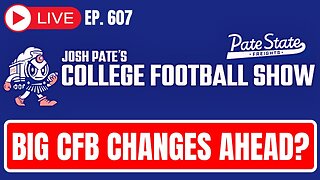Premium Only Content

Latest Research: This Fasting Diet Destroys Bone Density & Lean Mass!
a piece I recently read, published in April of 2023, cast some doubt on a very popular time restricted feeding diet, the diet in question is one that I am currently following, hence my interest.
I hope you enjoy my content and find it interesting or informative, if so, please consider supporting the channel by using one of the affiliate links below:
* Buy me a Kofi: https://ko-fi.com/mynmnexperiment
* Patreon: https://bit.ly/3hhfjl5
* SubscribeStar: https://bit.ly/3psYo23
ProHealth 15% Discount Code: MYNMN (https://www.prohealth.com/)
DoNotAge 10% Discount Code: MYNMN (https://bit.ly/2VBDgNt)
Renue by Science 10% Discount Code: MYNMN (https://renuebyscience.com/?rfsn=5692699.331801&coupon-code=MYNMN)
Renue by Science 15% Subscription Service Discount Code: MYNMNSUB
Please note that the links above are affiliate links, which means that if you use the code, I will receive a small commission, and if you do, may I say many thanks I advance for your support.
My Current Anti-Aging Protocol:
• 1.5 grams of NMN (https://bit.ly/3c2Fxt8)
• 1.5 grams of Trans-resveratrol (Tue, Thu & Sat) (https://bit.ly/3yxeqy2)
• 500mg Metformin
• 1.5 grams of TMG (https://bit.ly/3oe1Ted)
• 5,000 IU (International Units) of vitamin D3 (https://bit.ly/3P32hYH)
• 120 mcg (micrograms) of vitamin K2 (Mk 7) (https://bit.ly/3PhkBgn)
• 250mg Magnesium (L-Threonate) (https://bit.ly/3O4pZ5o)
• 200mg high molecular weight hyaluronic acid (https://bit.ly/3P0Z4c2)
• 2,400mg of Fisetin, on the 1st, 2nd & 3rd of each month (https://bit.ly/3P2rSB0)
• 2,400mg of Quercetin, on the 1st, 2nd & 3rd of each month (https://bit.ly/3IzulAy)
• Quercetin & Fisetin Periodic Dosing (https://bit.ly/3mw1IgN)
• 81mg of aspirin (https://bit.ly/3uFjtem)
• 800mg SIRT6 Activator (https://bit.ly/3MyfA4J)
• 600mg DIM (https://bit.ly/3ZX9NsG)
The author, Amanda Avery, starts the piece by writing “One of the latest trends among celebrities is the "one meal a day" diet (or "OMAD").
Fans of OMAD include Bruce Springsteen and Coldplay front-man Chris Martin. Many proponents of OMAD claim it helps them better manage their weight and keep fit.” Although a fad in the affluent West, it is, in many parts of the world, as a result of poverty, an unescapable way of life. But, is it as healthy as many self-proclaimed health and lifestyle experts would have you believe?
OMAD is essentially a more extreme version of other types of fasting diets, such as intermittent fasting and time-restricted eating. The main difference is that instead of only fasting on certain days, or only eating your meals during a specific time window, people following OMAD eat all their day's calories in one single, large meal. But while supporters of OMAD say that following the diet improves many aspects of health, we actually know very little about what effect eating just one meal a day has on the body – let alone if it's safe. Evidence supporting the use of OMAD is limited. Very few studies have actually looked at OMAD itself – and most of those that have were conducted in animals. As such, most of the claims that OMAD works are anecdotal, or they assume that if other forms of fasting can benefit health, then OMAD will too. Research into fasting diets is still emerging, some evidence indicates that one form of intermittent fasting known as the "5:2 diet" may help people better manage their weight. 5:2 is where a person eats normally five days a week (normally being not in a caloric deficit), then 800 calories or less two days a week). However, the author believes this diet is no better than other dietary approaches. Research has also found that time-restricted eating (where you eat all your day's calories within a specific window of time) can help people better manage their weight. This intermittent fasting approach has other health benefits too, such as lowering blood pressure. One review study found that many different types of fasting (including intermittent fasting and fasting every other day) can improve several aspects of metabolism. These include improving blood sugar and cholesterol levels, reducing inflammation levels, and helping people better regulate their appetite. This, in turn, may help reduce a person's risk of obesity, type 2 diabetes, and cardiovascular disease.
To date, only one study has looked at the effect of eating one meal a day in humans. In this study, the 11 participants (5 men and 6 women) were given the same number of calories to eat each day for the study's duration, the study lasted for 11 days.
FAIR-USE COPYRIGHT DISCLAIMER
Copyright Disclaimer Under Section 107 of the Copyright Act 1976, allowance is made for "fair use" for purposes such as criticism, commenting, news reporting, teaching, scholarship, and research. Fair use is a use permitted by copyright statute that might otherwise be infringing. Non-profit, educational, or personal use tips the balance in favor of fair use. #IntermittentFasting #LongevityDiet #HealthyLifestyle
#RenueByScience
-
 9:59
9:59
My Longevity Experiment
4 months ago $0.15 earnedWhy Skipping these 5 Supplements Leads to Serious Health Problems in your 50’s & 60”s
149 -
 56:14
56:14
Flyover Conservatives
1 day agoSick, Tired, & Foggy? The TRUTH About What’s Living in Your Gut! - Dr. Jason Dean | FOC Show
81.5K6 -
 34:24
34:24
Kimberly Guilfoyle
13 hours agoFaith, Fairness, and a Better Future: Live w/ Joy Pullmann & Elizabeth Mitchell | Ep.194
171K31 -
 1:12:20
1:12:20
Josh Pate's College Football Show
11 hours ago $6.28 earnedBig CFB Changes Coming | DeBoer Fixing Alabama | Signing Day Reaction | OhioSt vs Michigan Shift
72.4K2 -
 59:39
59:39
The StoneZONE with Roger Stone
7 hours agoEXCLUSIVE: James O'Keefe Talks to Roger Stone About Dropped Charges Against Him | The StoneZONE
55.3K4 -
 1:48:10
1:48:10
megimu32
7 hours agoON THE SUBJECT: Comedian LOSES It At Heckler!
34.8K8 -
 1:17:13
1:17:13
Redacted News
11 hours agoTRUMP IS BURNING IT ALL DOWN AND DEMOCRATS WANT HIM IMPEACHED AGAIN, USAID ROT GOES DEEP | Redacted
185K385 -
 52:23
52:23
Candace Show Podcast
12 hours agoUPDATE! Taylor Swift Goes Full Dragon Against Blake Lively | Candace Ep 144
162K272 -
 LIVE
LIVE
VOPUSARADIO
1 day agoPOLITI-SHOCK! KILL THE DEEP STATE!! PLUS: 3 SPECIAL GUESTS!
88 watching -
 54:41
54:41
LFA TV
1 day agoCorruption Like You Never Imagined | TRUMPET DAILY 2.6.25 7pm
50.1K19